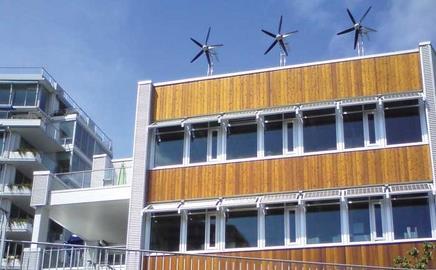Instead of seeing sustainability as a chore we should reap the social and economic benefits it can prompt, says the founder of Canada Green Building Council ahead of his talk at the Making Sustainable Development Happen event
Although we know that being green is vital for our future, for years we’ve believed that achieving the required standards inevitably involves a colossal cost burden on business.
But Joe Van Belleghem, managing partner at Windmill West, the developer of the super-sustainable Dockside Green scheme in Victoria, Canada (pictured), is adamant that this is not the case.
Talking to Building ahead of the Making Sustainable Development Happen conference, at which he will be speaking, Belleghem insists that being sustainable can be good for business.
At the conference he plans to use his flagship development as a real life example to demonstrate to attendees that if we stop seeing sustainability as a burden, we can reap the benefits.
“Dockside Green was built on the philosophy of the triple bottom line, which embraces economic, ecological and social objectives,” he says. “At the conference I’m hoping to show people that it is possible to be both sustainable and financially successful. We need to look at challenges differently.”

John Van Belleghem believes sustainability can be good for business
Belleghem, who has a background as a chartered accountant, adds: “We used to look at just the numbers, but now we need to look at nature and how paying attention to that can be good for business.”
It is not just benefits for business that Belleghem, who founded the Canada Green Building Council, hopes to emphasise. “When I refer to benefits I’m also talking about the implications that development can have on the wider community, in terms of tax savings, lower cost infrastructure and jobs.”
Dockside Green, for example, has its own sewage treatment plant and uses a thermochemical gasification process to create a synthetic gas that is burned to produce heat. “There is no such thing as waste in nature, and we need to use that as an example,” he says. “We need to learn how to place value on our natural capital.”
Now is the time to act, says Belleghem. He believes that the economic downturn and climate change are the main problems facing today’s world. He also believes that they offer the greatest opportunities to transform the way we think, build and do business.
Making sustainable development happen
The conference, organised by Building and the UK Green Building Council (UKGBC), will take place on 24 November at King’s Place, London. Joe Van Belleghem will be joined be a host of high-profile figures with expertise in sustainability, including John Sauven, the UK executive director of Greenpeace; Dame Ellen MacArthur, a former holder of record for the fastest solo circumnavigation of the globe in a yacht; Sunand Prasad, the immediate past president of the RIBA, Tony Pidgley, the chairman of the Berkeley Group; and Paul King, the chief executive of the UKGBC. To register to attend the conference or the Sustainability Awards, that take place straight after, visit http://events.building.co.uk
























